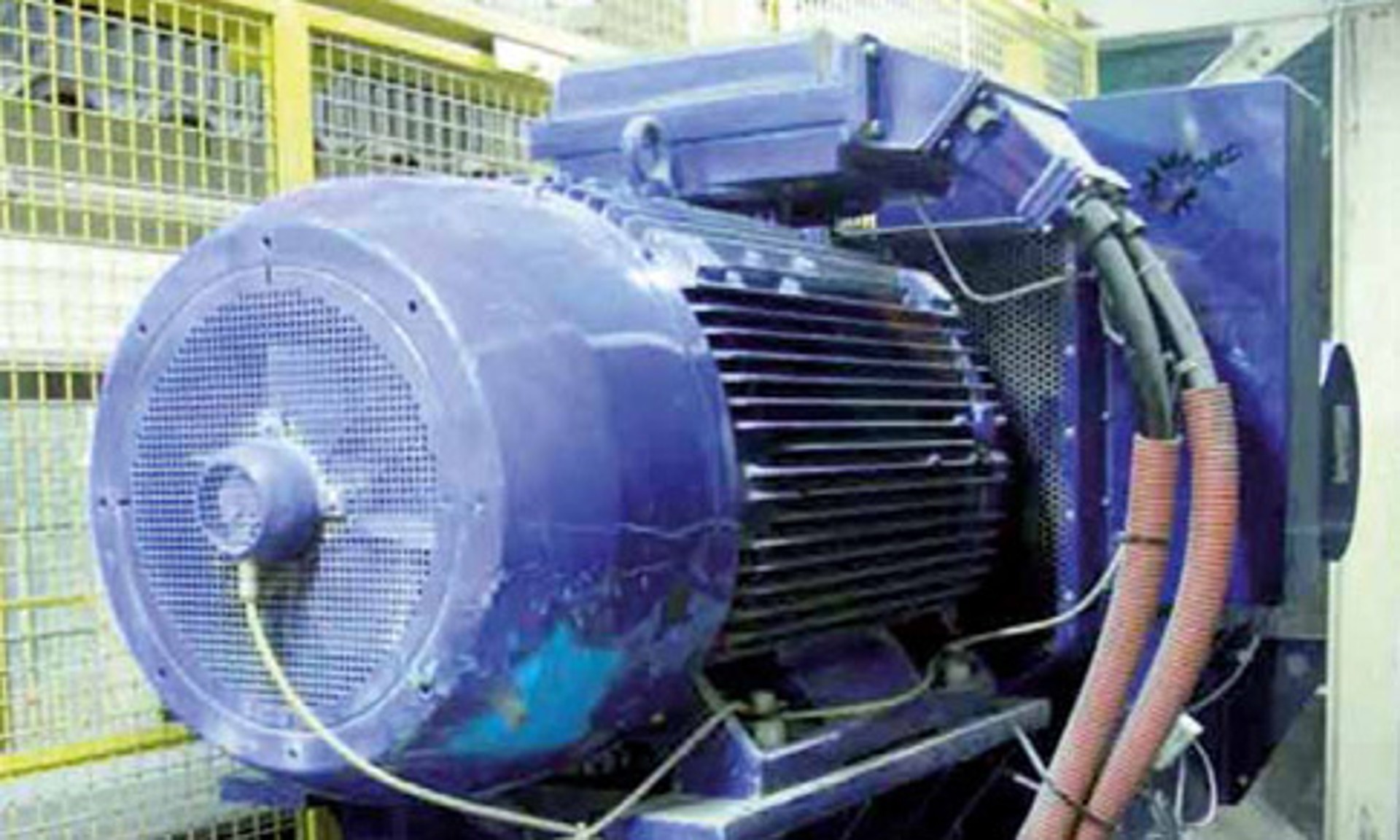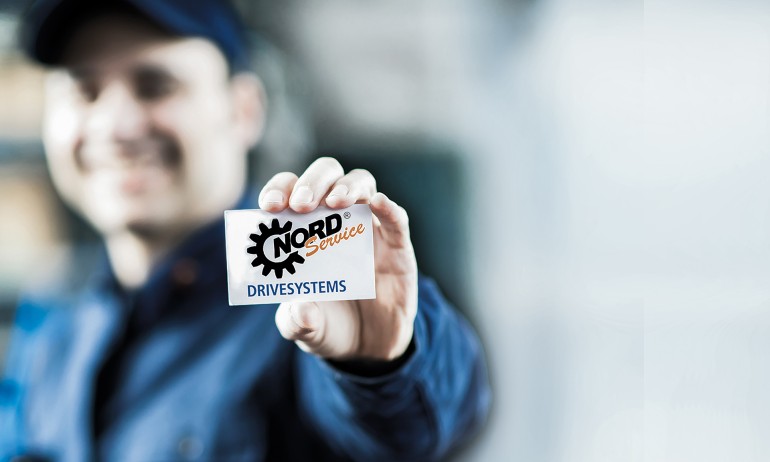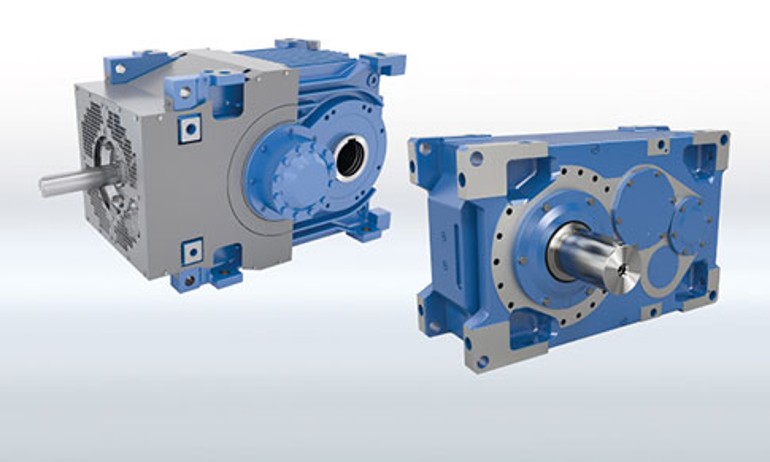Heavy duty work in the alps
Industrial gear units assist a gigantic construction project
With an extremely demanding construction project in the Swiss Alps - at about 1,700 metres above sea level - the heart of a gigantic project is being constructed deep inside the mountain: the underground cavern for a new pumping station, which will increase the present power of 280 NW to 1,480 NW. With an extreme incline of 45 degrees and a height difference of approximately 180 m, conveyor systems in a substation transport 500 t of excavated material per hour, around the clock.
Focus on the Customer
The "Linthal 2015" project includes excavation and construction work for the underground central station of the pumped storage power station and the tunnel system for the water that provides the power. Construction of a new heavyweight dam for the higher lake will increase its storage volume from the present 9 million m³ to 25 million m³. The existing compensating reservoir is also being expanded accordingly. Construction work on Switzerland's largest hydroelectric project is being carried out at considerably different altitudes and inside of the mountain. The main work in Switzerland's largest hydroelectric project is mainly being carried out inside of the mountain. The compensation reservoir at an altitude of about 800 m is the lowest point. One thousand metres above this is the upper Limmernboden reservoir with a capacity of 92 million m³.
At an altitude of about 1,700 m and some 600 m inside the mountain, the heart of this gigantic expansion project is being created with huge excavated chambers for the four groups of machinery with an output of 1,000 MW in the new Limmern pumped storage power station. The underground station consists of a 150 m long, 30 m wide machinery chamber with a maximum height of 53 m, as well as a separate transformer vault which is about 130 m long, 20 m wide and 25 m high. This central station creates the link between the two lakes via a system of upper and lower water delivery tunnels, parallel pressure shafts and other service tunnels.
Projekt Challenge
In the context of the extension project "Linthal 2015" a new, underground pumping station will pump water from the existing Limmerboden reservoir at an altitude of 1,860 metres to the 600 m higher Muttsee in order to power the turbines to generate electricity. This project is being constructed by the Kraftwerke Linth-Limmern AG.
In contrast to purely hydroelectric power stations, pumped storage power stations not only have an upper, but also an additional lowerreservoir. When power is generated, water from the upper reservoir flows into the pressure system. The water drives turbines, which in turn power the motor generator. The electrical power which is produced is fed into the grid. After leaving the turbine, the water flows into the lower reservoir. If too much electricity is produced, the water can be pumped back from the reservoir into the higher altitude lake, from where it can be used later to generate electricity. Pumped storage power stations can therefore store energy in the form of water in reservoirs. Pumped storage is a wellestablishedmethod of compensating for fluctuations of supply and demand in the grid network, in an environmentally friendly and economic manner.
Application Solution
The excavation work for the two chambers is now complete. The excavation of the rock was carried out continuously, i.e. 24/7 in 3-shift operation. The chambers were excavated downwards. Every day about 800 m³ of rock were removed from the mountain and in total almost 2,445,000 m³ were excavated from both chambers. NORD industrial gear units were used in the conveyor systems which are located in the central area of the "Linthal 2015" construction project. Two "S-conveyors" conveyed 500 t of material per hour over a distance of about 260 metres with an extreme incline of 45 degrees and a height difference of around 180 m. The excavated material was then conveyed down to a crushing plant. This conveyor belt was driven by a NORD industrial gear unit with brake control, which simultaneously generated electricity. On the second conveyor belt, the crushed material was conveyed up to the gravel plant, where it was stored until it was needed for further processing as construction aggregate for the dams or as concrete for walls and ceilings.
This conveyor belt was driven by two NORD industrial gear units, which were located on the left and the right of the conveyor belt and were connected by a common shaft. With a protection class of IP55, these industrial gear units each have a drive power of 250 kW. The speed of the conveyor belt is 2.2 m/s.
The supplier of this complete drive solution was Getriebebau NORD AG, Switzerland - a member of the NORD DRIVESYSTEMS Group. Customer orientation and closeness to customers are particularly important for the drive specialists from Arnegg, near St. Gallo. Guido Eigenmann, Manager of Getriebebau NORD AG, Switzerland explains: "We sell customer benefits - not just products. As well as this we offer a comprehensive service package. In addition to commissioning, we also provide maintenance training, so that the customer knows what to look out for. It is particularly important for us to supply complete systems which are highly efficient and economical. Users require not just drive components, but rather complete and functioning system solutions. We tailor our drive solutions to each individual customer."
The manager of the plant construction company is extremely satisfied with NORD products and services. "The very good cooperation with Getriebebau NORD Switzerland is particularly positive for me. All of our requirements were catered for. What is also remarkable is the high ability to supply. It only took ten weeks from ordering to delivery. With other suppliers, four or five months are not unusual. All-in-all we are very satisfied - a very good cost-benefit ratio, excellent advice and support, on-schedule delivery and last-butnot-least, NORD products deliver a very high performance and are of very good quality."




